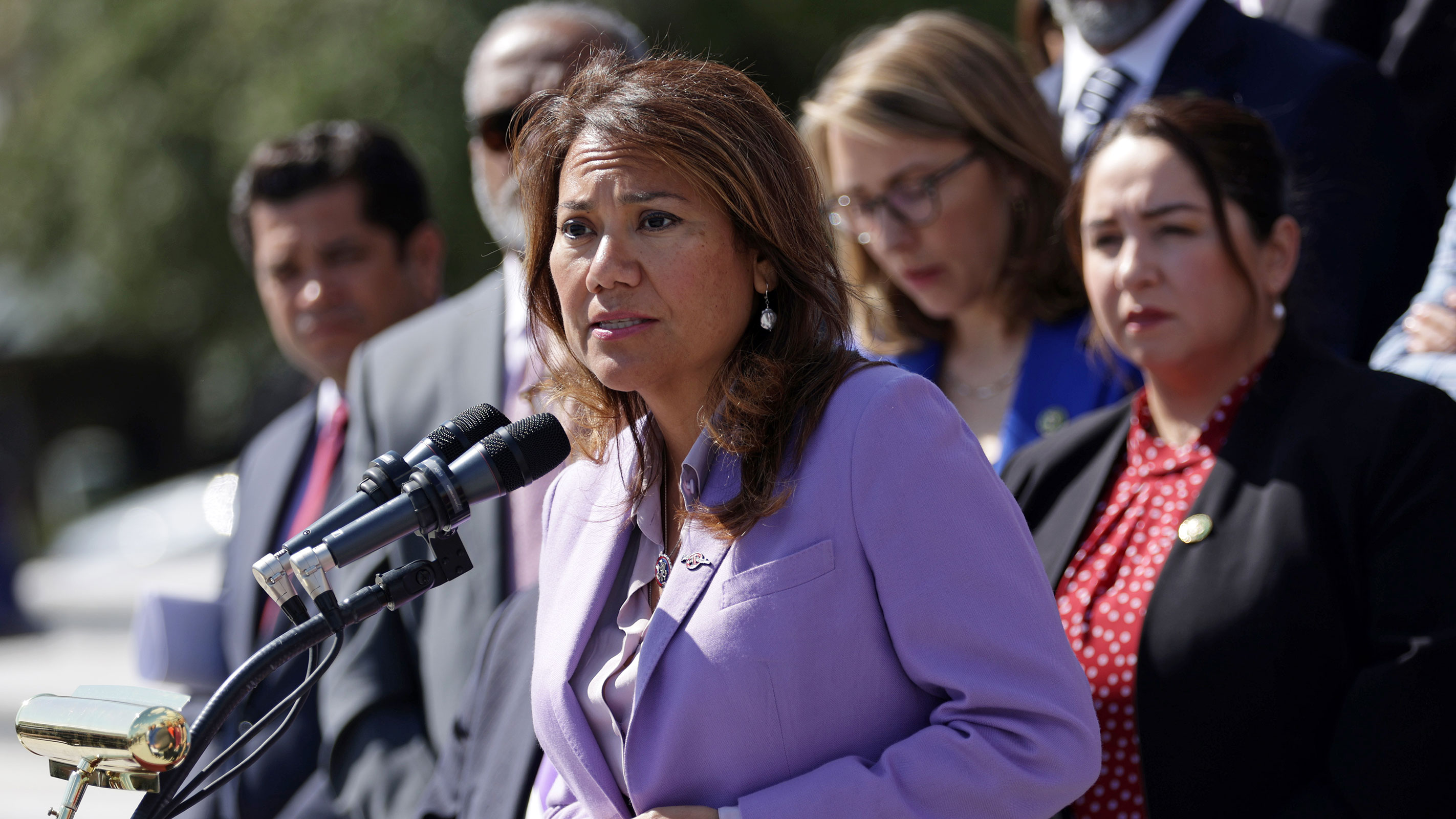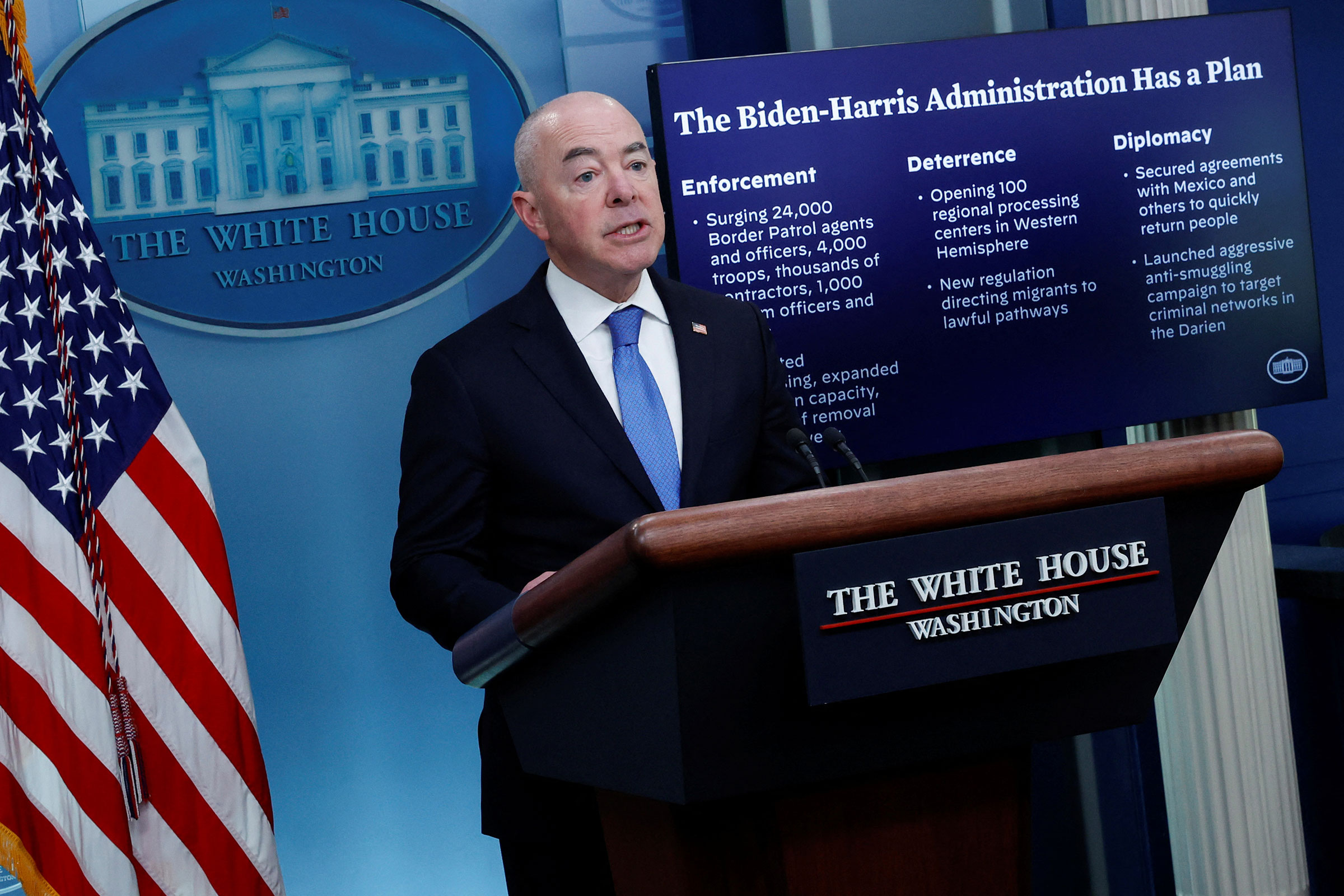The House Judiciary Committee hearing featuring Homeland Security Secretary Alejandro Mayorkas has begun.
He will face House Republicans who have been making the case to potentially impeach him over his handling of the US-Mexico border.



By Shawna Mizelle, Adrienne Vogt and Leinz Vales, CNN
The House Judiciary Committee hearing featuring Homeland Security Secretary Alejandro Mayorkas has begun.
He will face House Republicans who have been making the case to potentially impeach him over his handling of the US-Mexico border.
From CNN's Abby Baggini

Texas Democratic Rep. Veronica Escobar said the House GOP's calls to impeach Homeland Security Secretary Alejandro Mayorkas are "all a distraction tactic."
"This is all a distraction tactic so that Republicans have something to give the American people to focus on," she said to CNN ahead of his congressional testimony today. "It's (House Speaker) Kevin McCarthy's reward to his most extreme members of the Republican party."
Republicans have accused Mayorkas of undermining the operational control of the southern border, encouraging illegal immigration and lying to Congress that the border was secure – all charges that the administration has dismissed. On Wednesday, GOP members will likely grill Mayorkas on all those issues, even though there have been fewer border arrests in recent weeks.
Escobar also addressed the floating buoys installed by Texas in the Rio Grande, calling them "horrific and not a deterrent."
Escobar said Texas Gov. Greg Abbott does not have the jurisdiction and that the matter "is a federal responsibility."
In a statement on Monday, Abbott claimed that the string of buoys were legal because the Constitution "grants Texas sovereign authority to protect its borders." The Department of Justice is suing Texas over the string of buoys deployed by the state, saying it violates federal environmental law and threatens public safety.
The Texas congresswoman told CNN that while she is "uncomfortable" with the current border asylum policy, she believes it is "the best that the Biden administration has come up with." Escobar said the administration "is doing everything possible as the executive in the absence of congressional action."
Escobar, who sits on the House Judiciary Committee, had previously been critical of the administration's policies and expressed disappointment with its use of migration deterrence.
"The only alternative is for Congress to legislate," she urged.
From CNN's Priscilla Alvarez and Hannah Rabinowitz

The US Department of Justice is suing the state of Texas over its use of floating barriers in the Rio Grande, which Gov. Greg Abbott has argued is intended to deter migrants from crossing into the state from Mexico.
The Justice Department is seeking an injunction to bar Texas from building additional barriers in the river and asking a court to order the state to take the existing barriers down at its own expense.
In the lawsuit, filed in the US District Court in the Western District of Texas, the department alleges that Texas and Abbott, a Republican, violated the Rivers and Harbors Appropriation Act by building a structure in US water without permission from United States Army Corps of Engineers.
The lawsuit further alleges that the floating barriers “constitute an unauthorized obstruction to the navigable capacity of waters of the United States.”
“We allege that Texas has flouted federal law by installing a barrier in the Rio Grande without obtaining the required federal authorization,” Associate Attorney General Vanita Gupta said in a statement. “This floating barrier poses threats to navigation and public safety and presents humanitarian concerns. Additionally, the presence of the floating barrier has prompted diplomatic protests by Mexico and risks damaging US foreign policy.”
Abbott defies DOJ request: The lawsuit comes after Abbott said earlier Monday that he would not order the floating barriers be removed from the Rio Grande, in defiance of a Justice Department request.
“Texas will fully utilize its constitutional authority to deal with the crisis you have caused,” Abbott wrote in a letter to President Joe Biden following last week’s DOJ request to remove the barriers. He added, “Texas will see you in court, Mr. President.”
The Justice Department’s legal action over the floating barriers is based on a clause in federal law that “prohibits the creation of any obstruction to the navigable capacity of waters of the United States, and further prohibits building any structure in such waters without authorization from the United States Army Corps of Engineers.”
Abbott claimed in a Fox News appearance Monday evening that the clause does not apply but did not say why.
“The fact of the matter is they are using some obscure statute to try and stop us from continuing to deploy those buoys,” the governor said. “It’s not grounded in law whatsoever.”
The showdown between Abbott and the federal government comes as Texas’ treatment of migrants who attempt to cross into the US illegally faces increased scrutiny.
Administration says Abbot's measures have hindered border patrol: Biden administration officials have grown increasingly concerned in recent months about Abbott’s measures, which have disrupted US Border Patrol operations in the region and put migrants at risk.
A Homeland Security official told CNN last week that Abbott’s moves are “making our job harder” while disturbing images of migrants with injuries and troubling reports of Texas troops pushing migrants back to Mexico have drawn criticism from the White House and scores of Democratic lawmakers.
The Justice Department told Texas on Thursday that it intended to file legal action against the placement of the floating barriers in the Rio Grande as part of the state’s operation along the Texas-Mexico border, according to sources familiar and a letter obtained by CNN.
Read more about DOJ's lawsuit here.
From CNN's Annie Grayer, Melanie Zanona and Priscilla Alvarez

Republicans have already filed various impeachment articles against Homeland Security Secretary Alejandro Mayorkas — more recently in June.
GOP lawmakers have accused Mayorkas of undermining the operational control of the southern border, encouraging illegal immigration and lying to Congress that the border was secure — all charges that the Biden administration has dismissed.
But behind the scenes, supporters of the effort are still working to convince key holdouts to get on board with the potentially divisive plan.
House Homeland Security Chairman Mark Green in June outlined a five-phase investigation into Mayorkas and his handling of the border, accompanied by a preliminary report and a hearing focused on framing Mayorkas’ “dereliction of duty,” which starts a roughly three-month countdown for House Republican leadership and their allies to get the House GOP conference in alignment.
More GOP support is needed in efforts to remove Mayorkas: Lobbying effort starts with Republicans on the House Judiciary Committee, who would be responsible for formalizing Green’s investigative findings into official impeachment proceedings. So far, however, not every GOP member on the panel is sold on the idea.
The hope from outspoken supporters of a Mayorkas impeachment is that the Homeland Security Committee hearings over the next few months will help build momentum in the GOP conference.
“I think these Homeland hearings will definitely help anybody that isn’t there yet get on board,” said GOP Rep. Marjorie Taylor Greene of Georgia, who also has launched her own articles of impeachment against Mayorkas, and was silenced from speaking in a hearing in April for calling Mayorkas a liar.
Achieving unity among Republicans on the Judiciary Committee is only part of the battle, though. House Speaker Kevin McCarthy would still have to get the rest of his conference to support rare impeachment proceedings against a Cabinet secretary, which would be dead on arrival in the Senate. And while some moderates in key swing districts have started to warm up to the idea, others are still skeptical.
GOP Rep. Clay Higgins of Louisiana, who has filed his own articles of impeachment against Mayorkas and serves on the Homeland Security Committee, said broadly of the conference, “There are votes. Whether or not there is enough, that’s another question.”
GOP leadership moving cautiously: That means the next few months could put already frayed relationships inside the fractious GOP conference to the test, with McCarthy under increasing pressure to cater to his right flank after the debt ceiling deal without upsetting his so-called majority makers. Even just passing a border security package — a messaging bill designed to fulfill a key campaign promise —proved exceedingly difficult. That’s why GOP leadership and key committee chairmen have considered carefully how they discuss the topic of impeachment publicly.
Legal grounds for impeachment are not sound: Legal experts have also thrown cold water on the Republican basis for impeaching Mayorkas, arguing that it appears to be over political disagreements and doesn’t rise to the level of high crimes and misdemeanors.
House Republicans have anchored their criticisms in President Joe Biden’s decision to scrap Trump-era border policies, but the Biden administration has since put in place restrictive measures that, in effect, limit who’s eligible for asylum at the border. Homeland Security officials have pointed toward a dramatic drop in border crossings since the end of a Covid-era border restriction, known as Title 42. Since May 11, when the authority expired, border crossings have dropped more than 70%.
From CNN's Priscilla Alvarez

US Department of Homeland Security Secretary Alejandro Mayorkas denounced Tuesday’s ruling against the Biden administration’s asylum policy.
“We strongly disagree with today’s ruling and are confident that the Circumvention of Lawful Pathways rule is lawful," he said in a statement. “To be clear, because the district court temporarily stayed its decision, today’s ruling does not change anything immediately. It does not limit our ability to deliver consequences for unlawful entry. Do not believe the lies of smugglers."
The ruling against the Biden administration could have major implications on the US-Mexico border, where crossings have plummeted since the rollout of the asylum policy, among other measures. A Justice Department spokesperson told CNN that the department plans to appeal.
“The Justice Department disagrees with the district court’s ruling today in the East Bay case and intends to appeal the decision and to seek a stay pending appeal. We remain confident in our position that the Circumvention of Lawful Pathways rule is a lawful exercise of the broad authority granted by the immigration laws,” the spokesperson said.
Judge Jon Tigar of the California Northern District Court previously ruled against a similar policy under the Trump administration and expressed skepticism that there was any daylight between Biden’s policy and the Trump-era one during a court hearing last week. Administration officials have rejected the comparison to Trump-era rules.
The Biden administration has rolled out a series of measures to try to stem the flow of migration and manage the situation along the US-Mexico border but is facing multiple lawsuits from Republican states as well as advocates, posing a risk to Biden’s border plans.
Tigar’s ruling stems from a lawsuit brought by the American Civil Liberties Union among other immigrant rights groups over a new asylum rule that largely bars migrants who passed through another country from seeking asylum in the United States, marking a departure from decades-long protocol.
The Biden policy, like the Trump-era one, garnered wide condemnation from Biden allies, including Democratic lawmakers and immigrant advocates when it was rolled out. “To be clear, this was not our first preference or even our second,” an administration official conceded at the time, adding that the onus is on Congress to pass reform.
Read more about the ruling here.
The House Judiciary Committee hearing featuring Homeland Security Secretary Alejandro Mayorkas has begun.
He will face House Republicans who have been making the case to potentially impeach him over his handling of the US-Mexico border.

Texas Democratic Rep. Veronica Escobar said the House GOP's calls to impeach Homeland Security Secretary Alejandro Mayorkas are "all a distraction tactic."
"This is all a distraction tactic so that Republicans have something to give the American people to focus on," she said to CNN ahead of his congressional testimony today. "It's (House Speaker) Kevin McCarthy's reward to his most extreme members of the Republican party."
Republicans have accused Mayorkas of undermining the operational control of the southern border, encouraging illegal immigration and lying to Congress that the border was secure – all charges that the administration has dismissed. On Wednesday, GOP members will likely grill Mayorkas on all those issues, even though there have been fewer border arrests in recent weeks.
Escobar also addressed the floating buoys installed by Texas in the Rio Grande, calling them "horrific and not a deterrent."
Escobar said Texas Gov. Greg Abbott does not have the jurisdiction and that the matter "is a federal responsibility."
In a statement on Monday, Abbott claimed that the string of buoys were legal because the Constitution "grants Texas sovereign authority to protect its borders." The Department of Justice is suing Texas over the string of buoys deployed by the state, saying it violates federal environmental law and threatens public safety.
The Texas congresswoman told CNN that while she is "uncomfortable" with the current border asylum policy, she believes it is "the best that the Biden administration has come up with." Escobar said the administration "is doing everything possible as the executive in the absence of congressional action."
Escobar, who sits on the House Judiciary Committee, had previously been critical of the administration's policies and expressed disappointment with its use of migration deterrence.
"The only alternative is for Congress to legislate," she urged.

The US Department of Justice is suing the state of Texas over its use of floating barriers in the Rio Grande, which Gov. Greg Abbott has argued is intended to deter migrants from crossing into the state from Mexico.
The Justice Department is seeking an injunction to bar Texas from building additional barriers in the river and asking a court to order the state to take the existing barriers down at its own expense.
In the lawsuit, filed in the US District Court in the Western District of Texas, the department alleges that Texas and Abbott, a Republican, violated the Rivers and Harbors Appropriation Act by building a structure in US water without permission from United States Army Corps of Engineers.
The lawsuit further alleges that the floating barriers “constitute an unauthorized obstruction to the navigable capacity of waters of the United States.”
“We allege that Texas has flouted federal law by installing a barrier in the Rio Grande without obtaining the required federal authorization,” Associate Attorney General Vanita Gupta said in a statement. “This floating barrier poses threats to navigation and public safety and presents humanitarian concerns. Additionally, the presence of the floating barrier has prompted diplomatic protests by Mexico and risks damaging US foreign policy.”
Abbott defies DOJ request: The lawsuit comes after Abbott said earlier Monday that he would not order the floating barriers be removed from the Rio Grande, in defiance of a Justice Department request.
“Texas will fully utilize its constitutional authority to deal with the crisis you have caused,” Abbott wrote in a letter to President Joe Biden following last week’s DOJ request to remove the barriers. He added, “Texas will see you in court, Mr. President.”
The Justice Department’s legal action over the floating barriers is based on a clause in federal law that “prohibits the creation of any obstruction to the navigable capacity of waters of the United States, and further prohibits building any structure in such waters without authorization from the United States Army Corps of Engineers.”
Abbott claimed in a Fox News appearance Monday evening that the clause does not apply but did not say why.
“The fact of the matter is they are using some obscure statute to try and stop us from continuing to deploy those buoys,” the governor said. “It’s not grounded in law whatsoever.”
The showdown between Abbott and the federal government comes as Texas’ treatment of migrants who attempt to cross into the US illegally faces increased scrutiny.
Administration says Abbot's measures have hindered border patrol: Biden administration officials have grown increasingly concerned in recent months about Abbott’s measures, which have disrupted US Border Patrol operations in the region and put migrants at risk.
A Homeland Security official told CNN last week that Abbott’s moves are “making our job harder” while disturbing images of migrants with injuries and troubling reports of Texas troops pushing migrants back to Mexico have drawn criticism from the White House and scores of Democratic lawmakers.
The Justice Department told Texas on Thursday that it intended to file legal action against the placement of the floating barriers in the Rio Grande as part of the state’s operation along the Texas-Mexico border, according to sources familiar and a letter obtained by CNN.
Read more about DOJ's lawsuit here.

Republicans have already filed various impeachment articles against Homeland Security Secretary Alejandro Mayorkas — more recently in June.
GOP lawmakers have accused Mayorkas of undermining the operational control of the southern border, encouraging illegal immigration and lying to Congress that the border was secure — all charges that the Biden administration has dismissed.
But behind the scenes, supporters of the effort are still working to convince key holdouts to get on board with the potentially divisive plan.
House Homeland Security Chairman Mark Green in June outlined a five-phase investigation into Mayorkas and his handling of the border, accompanied by a preliminary report and a hearing focused on framing Mayorkas’ “dereliction of duty,” which starts a roughly three-month countdown for House Republican leadership and their allies to get the House GOP conference in alignment.
More GOP support is needed in efforts to remove Mayorkas: Lobbying effort starts with Republicans on the House Judiciary Committee, who would be responsible for formalizing Green’s investigative findings into official impeachment proceedings. So far, however, not every GOP member on the panel is sold on the idea.
The hope from outspoken supporters of a Mayorkas impeachment is that the Homeland Security Committee hearings over the next few months will help build momentum in the GOP conference.
“I think these Homeland hearings will definitely help anybody that isn’t there yet get on board,” said GOP Rep. Marjorie Taylor Greene of Georgia, who also has launched her own articles of impeachment against Mayorkas, and was silenced from speaking in a hearing in April for calling Mayorkas a liar.
Achieving unity among Republicans on the Judiciary Committee is only part of the battle, though. House Speaker Kevin McCarthy would still have to get the rest of his conference to support rare impeachment proceedings against a Cabinet secretary, which would be dead on arrival in the Senate. And while some moderates in key swing districts have started to warm up to the idea, others are still skeptical.
GOP Rep. Clay Higgins of Louisiana, who has filed his own articles of impeachment against Mayorkas and serves on the Homeland Security Committee, said broadly of the conference, “There are votes. Whether or not there is enough, that’s another question.”
GOP leadership moving cautiously: That means the next few months could put already frayed relationships inside the fractious GOP conference to the test, with McCarthy under increasing pressure to cater to his right flank after the debt ceiling deal without upsetting his so-called majority makers. Even just passing a border security package — a messaging bill designed to fulfill a key campaign promise —proved exceedingly difficult. That’s why GOP leadership and key committee chairmen have considered carefully how they discuss the topic of impeachment publicly.
Legal grounds for impeachment are not sound: Legal experts have also thrown cold water on the Republican basis for impeaching Mayorkas, arguing that it appears to be over political disagreements and doesn’t rise to the level of high crimes and misdemeanors.
House Republicans have anchored their criticisms in President Joe Biden’s decision to scrap Trump-era border policies, but the Biden administration has since put in place restrictive measures that, in effect, limit who’s eligible for asylum at the border. Homeland Security officials have pointed toward a dramatic drop in border crossings since the end of a Covid-era border restriction, known as Title 42. Since May 11, when the authority expired, border crossings have dropped more than 70%.

US Department of Homeland Security Secretary Alejandro Mayorkas denounced Tuesday’s ruling against the Biden administration’s asylum policy.
“We strongly disagree with today’s ruling and are confident that the Circumvention of Lawful Pathways rule is lawful," he said in a statement. “To be clear, because the district court temporarily stayed its decision, today’s ruling does not change anything immediately. It does not limit our ability to deliver consequences for unlawful entry. Do not believe the lies of smugglers."
The ruling against the Biden administration could have major implications on the US-Mexico border, where crossings have plummeted since the rollout of the asylum policy, among other measures. A Justice Department spokesperson told CNN that the department plans to appeal.
“The Justice Department disagrees with the district court’s ruling today in the East Bay case and intends to appeal the decision and to seek a stay pending appeal. We remain confident in our position that the Circumvention of Lawful Pathways rule is a lawful exercise of the broad authority granted by the immigration laws,” the spokesperson said.
Judge Jon Tigar of the California Northern District Court previously ruled against a similar policy under the Trump administration and expressed skepticism that there was any daylight between Biden’s policy and the Trump-era one during a court hearing last week. Administration officials have rejected the comparison to Trump-era rules.
The Biden administration has rolled out a series of measures to try to stem the flow of migration and manage the situation along the US-Mexico border but is facing multiple lawsuits from Republican states as well as advocates, posing a risk to Biden’s border plans.
Tigar’s ruling stems from a lawsuit brought by the American Civil Liberties Union among other immigrant rights groups over a new asylum rule that largely bars migrants who passed through another country from seeking asylum in the United States, marking a departure from decades-long protocol.
The Biden policy, like the Trump-era one, garnered wide condemnation from Biden allies, including Democratic lawmakers and immigrant advocates when it was rolled out. “To be clear, this was not our first preference or even our second,” an administration official conceded at the time, adding that the onus is on Congress to pass reform.
Read more about the ruling here.